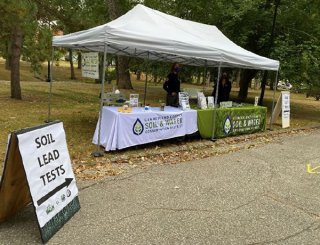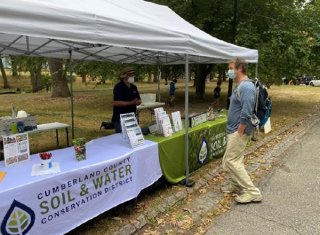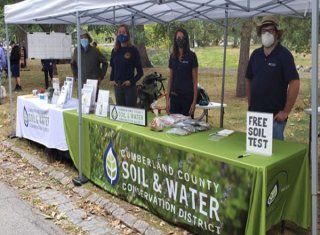R1 Success Story: SoilSHOP, Portland, Maine

EPA Grant Recipient:
Cumberland County Soil and Water Conservation District (CCSWCD)
Grant Types:
Healthy Communities Grant
Residents in towns across New England have learned about the health of their soil, thanks to a program organized by EPA and local communities to provide free events that raise awareness about lead in soil. To participate, residents bring soil samples from their yards and gardens to a soil screening event that usually provides results on the same day. EPA and other public health staff are there to interpret the results and discuss ways to reduce potential exposure to lead in soil.
Download Success Story:
SoilSHOP Portland, Maine (pdf)
Introduction
To promote public health and raise awareness about lead risks in soil, EPA New England conducts events through its Soil Screening, Health, Outreach and Partnership, or "soilSHOP," a program developed by the federal Agency for Toxic Substances and Disease Registry (ATSDR). The program partners with one or two communities to create events that involve EPA’s mobile chemistry lab, which does the soil screening, and EPA staff, who help explain screening results and offer lead safety tips.
What is lead?
Lead is a naturally occuring metal found in all parts of the environment, including air, water, soil, and even homes. Due to its versatility, it was commonly used as an ingredient in paint, gasoline, and water pipes. However, due to its harmful effects on children, pregnant women, and adults, lead has been banned or removed from paint, gasoline, water pipes, and other products. Nonetheless, the historic use of lead has contaminated the environment, especially soil, posing a problem for gardeners.
Lead is one of the most common pollutants found in soil and, according to the Centers for Disease Control and Prevention (CDC), there is no safe level of lead. This means that gardening in soil with any amount of lead can cause lead poisoning. It is important to understand the risks of gardening in contaminated soil and seek out resources to learn what can be done.
EPA SoilSHOP
The first step in planning a soilSHOP is to find a community organization or individual who will help schedule a soilSHOP as part of a community event, such as a spring garden fair, farmers market, or health awareness event. EPA and its partner agencies then set up the mobile lab, a table to accept lead soil samples, and a booth to welcome visitors and display flyers and factsheets. Community members are encouraged to bring samples of soil from their yards or gardens to the event, where they are screened for lead and other heavy metals at no cost. Participants typically receive soil screening results within about 30 minutes and learn how to interpret the data. EPA staff help explain how to reduce lead exposure from gardens and prevent lead poisoning in and around the home.
By using a "citizen science" approach, soilSHOPs encourage public participation and improve understanding of the sciences. This community-based effort allows citizens to learn about and prepare themselves to address lead health risks.
"SoilSHOPS are a fast and effective way to support our community by providing useful information about lead in soil. Community members leave with a better understanding of what they can do to protect themselves and garden safely. We have received a large amount of positive feedback about the event, along with many requests to bring additional soilSHOP events to the region."
Damon Yakovleff,
Environmental Planner
Cumberland County Soil & Water Conservation District
SoilSHOP Event in Portland, Maine

On Sept. 26, 2020, EPA New England partnered with the Cumberland Couny Soil and Water Conservation District (CCSWCD) to organize a safe and socially-distanced soilSHOP event at the Deering Oaks Park Farmer's Market in Portland, Maine. As a 2019 recipient of EPA's Healthy Communities grant, the Conservation District was already in the process of screening soil for lead contamination at gardens in Portland. This made the organization the perfect soilSHOP partner, ready to use their contacts and expertise to help plan and promote the event. The issue of lead-contaminated soil has a long history with gardens in Portland. In the 1800s, a series of major fires in Portland destroyed parts of the city. The largest and most destructive was the Great Fire of 1866, which left behind mounds of debris contaminated with lead. To rebuild the city, all the debris was pushed into the Back Cove, where it served as fill for the foundation of many of today's buildings. Over 150 years later, elevated levels of lead persist and may threaten many of the homes and gardens in Greater Portland.

Staff at the 6-hour soilSHOP explained safety tips related to lead in soil to over 70 local residents, including 15 families with young children. A total of 43 soil samples were brought to EPA's regional laboratory for screening using an X-ray fluorescence unit to screen all of the samples in a single day. Results ranged from 21 to 2,800 parts per million (ppm). For reference, EPA’s standard for lead concentration in bare soil in play areas is 400 ppm. Staff at the District contacted participants to explain the screening results, answer questions, and provide additional resources. Due to pandemic-related health concerns, the soilSHOP event reduced the number of staff on site, complied with social distancing and face mask protocols, and used safe soil sample collection methods. Instead of bringing the mobile laboratory to the event, EPA staff transported soil samples to the EPA laboratory in Chelmsford, Massachusetts.
This innovative approach demonstrated how EPA Region 1 can work with community partners to safely provide outreach, education, and technical assistance even when faced with unique challenges. Thanks to this effort, Portland residents know more about lead in their soil and can take steps to minimize risk and protect residents from lead exposure.
For more information:
Visit the EPA Brownfields website at www.epa.gov/brownfields or contact Robert Guillemin at 617-918-1814 or Guillemin.Robert@epa.gov.
EPA 901-F-20-005
December 2020
